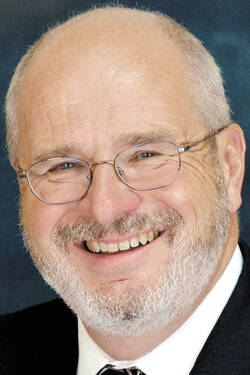The applause from more than 500 high school journalists following the conversation between journalism powerhouses Carole Simpson and Linsey Davis fills the Franklin College gym.
Davis is on a stage with four vertical banners celebrating the foundational principles of the Indiana High School Press Association — truth, courage, integrity and freedom — standing behind her. Simpson is on a huge video screen, appearing from her home in Boston, Massachusetts.
Simpson and Davis — two of the first three Black women in history to anchor national network newscasts — are the keynoters for IHSPA’s 100th convention.
From the moment the two women began their conversation, the young people in the audience dialed in on the discussion. If they touched their phones, it was to use them to take photos of the two women.
Simpson and Davis talked about doing their jobs, which turned out to be about making history.
Simpson, 83, became the anchor of the Sunday edition of “ABC World News Tonight” in 1988. She stayed in the chair until 2003. She was the first Black woman to anchor a national network newscast.
Before that, she’d shattered barriers by working as a reporter and anchor on Chicago radio and television, then a congressional reporter in Washington, D.C.
Simpson makes clear to the young journalists in the crowd that much of her success came from her determination not to surrender to bigotry. Whenever she heard the word “no,” she redoubled her efforts.
It wasn’t easy. She tells the students of the time her boss told her that no one wanted to hear a woman do the news. Another time, a white male colleague said he could be an anchor, too, if he put on blackface and wore a dress.
Three years ago, Davis, 46, moved into the ABC anchor chair Simpson once occupied. She also anchors the streaming news show “ABC News Live Prime With Linsey Davis.” Her ascension to ABC followed stints in local markets, including a five-year stay in Indianapolis.
At one point, Simpson asks Davis if she still must contend with prejudice while doing her job. Davis says the barriers aren’t as overt as the ones Simpson confronted.
But they do remain.
Students line up to ask questions. The line stretches almost from one end of the gym to the other.
The young journalists want to know how the two women overcame obstacles.
As they listen, I can see the students draw strength and inspiration from what Davis and Simpson tell them. After asking their questions, they almost skip back to their seats.
My reaction is more varied.
Beneath the admiration I have for Simpson and Davis, I also feel an anger rising.
When we discuss bigotry in this country, we generally focus on its moral indefensibility. That is appropriate, because denying human beings their dignity as human beings based on race, gender or other inherent considerations is wrong.
Just wrong.
But the focus on morality often prompts us to overlook the sheer stupidity of racism and sexism.
Davis is a friend of mine, as well as a colleague. She is the professional in residence at Franklin College’s Pulliam School of Journalism, where I am the director.
She also is one of the finest journalists of her generation, a woman with an acute intelligence and an unerring ethical compass. She tells stories so well because she values both the truth and the people who want and need it to hear it.
I don’t know Simpson as well as I do Davis.
Any thinking person, though, who spends a few minutes in Simpson’s presence realizes she is a force. Her mind is as sharp as a new razor. Her drive to inform the public is as powerful as a nuclear reactor.
That these two formidable Black women — these two immensely talented human beings — had to spend time and energy dealing with any obstacle other than figuring out how to maximize their gifts strikes me not just as a needless and mean-spirited indignity, but also as a tremendous and tragic waste. Multiply that by millions upon millions of people and the loss to human achievement and the senseless suffering of myriad human beings stagger comprehension.
Maybe that is why the students clap so hard for Davis and Simpson.
These young journalists realize these two Black women are embodiments of truth, courage, integrity and freedom.
The young people see what, sadly, so many others have missed.
John Krull is director of Franklin College’s Pulliam School of Journalism and publisher of TheStatehouseFile.com, a news website powered by Franklin College journalism students. The views expressed are those of the author only and should not be attributed to Franklin College. Send comments to [email protected].





